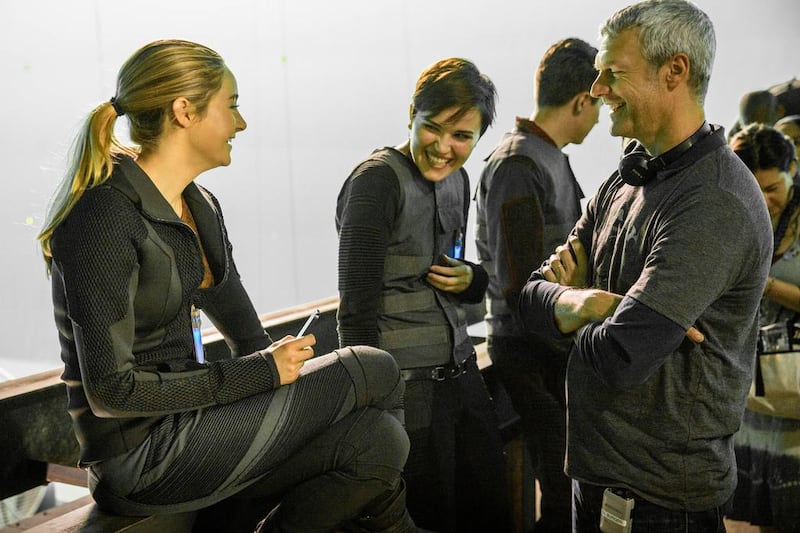There seems to be no quenching the thirst for bringing young-adult literature to the big screen. Following the success of the Twilight series and The Hunger Games, which together have grossed about US$5 billion (Dh18bn) in cinemas worldwide, a number of young-adult novels have been adapted by Hollywood. Beautiful Creatures, Warm Bodies, I Am Number Four, Ender’s Game and The Mortal Instruments: City of Bones – to name but five – have experienced varying success at the box office.
Now comes Divergent, an adaptation of Veronica Roth’s hit dystopian sci-fi novel that looks set to rival Twilight and The Hunger Games for a slice of the oh-so-lucrative teenage market. With Insurgent and Allegiant completing Roth’s trilogy, the books so far have sold more than 5 million copies worldwide. Meanwhile, the industry paper Variety reported recently that the film could debut to a $50 million-plus opening weekend in the United States alone.
Co-produced by Summit, the company behind Twilight, and Lionsgate, which bankrolled The Hunger Games, Divergent’s backers clearly have a track record in this arena. “I don’t know if it will get any Twilight comparisons, because it’s a different genre,” says the film’s 29-year-old British male lead, Theo James. “It’s sci-fi and that’s fantasy. I guess there are some parallels with Hunger Games. Mainly that it’s set in the future and it has a female lead protagonist.”
That female may not be as deadly as Jennifer Lawrence’s Katniss Everdeen in The Hunger Games, but Beatrice “Tris” Prior (Shailene Woodley) also emerges as a “chosen one” heroine. Likewise, the film is set in a world where political oppression rules. Set in a decaying future vision of Chicago, society has been remoulded into five factions, based on personality types: Abnegation, Amity, Candor, Dauntless and Erudite. Each teenager must join one of these factions for life.
In a world, rather like The Hunger Games, where rebellion is brewing, as James puts it: “It has this grimy feel where things are a little bit rundown and underpopulated and undernourished slightly; a sense of a society that is functioning but on the edge of a crack, or a fissure of some kind, in the social construct.”
James plays Four, an instructor in the warrior-like Dauntless faction, who mentors Tris when she joins up. “He’s a very honourable, morally centred person,” claims James.
Whatever James thinks, Divergent merits comparisons to both Twilight and The Hunger Games, not least because it’s following those films’ blueprints closely. Each has hired respectable directors – names such as Catherine ardwicke, Bill Condon, Gary Ross and now Neil Burger, who made Limitless (2011) and The Illusionist (2006). Each has strong female leads; Woodley is already being dubbed the new Jennifer Lawrence. And each has plumped for British male co-stars – from Robert Pattinson and Sam Claflin to Theo James here.
Perhaps the biggest coup for Divergent is scoring Kate Winslet in support (echoing The Hunger Games’s casting of the late Philip Seymour Hoffman). In a rare blockbuster outing for Winslet – arguably her first since Titanic – she plays Jeanine Matthews, the power-grasping head of the intellectual Erudite faction. “I play a real baddy. And I’m really mean,” Winslet says, with glee. “It was really, really great – just to do something so totally and utterly different.”
It wasn’t simply this that drew her to the film. “I completely found it fascinating. I didn’t find it in any way teen or tween. It’s quite sophisticated writing, very sophisticated themes,” she says.
“And what I loved about it too is that it doesn’t matter how old you are or what’s happening in your own life, we will always all want to come from somewhere and belong somewhere, and come from something in order to count. It really taps into those values, I think, in a really clever and sometimes sinister way.”
The sinister aspect of Divergent rumbles below the surface, hinting at the Holocaust and the Nazi Final Solution in the Second World War. “It’s based on purity,” says James. “This idea [that] you have to be pure. A Divergent isn’t pure. It’s someone of mixed mental capacity. They don’t fit into one group.” This becomes clear early on when Tris takes the mandatory aptitude tests that all teens are required to complete before selecting their faction; her results suggests she is a rare species of Divergent, scoring highly in three different skill-sets.
Of course, the predominantly female adolescent audience will probably be less concerned with political allegory than the blossoming romance between Tris and Four (and, in a marvellously timed piece of PR, James and Woodley are dating in real life). At least James reports that the book’s “beloved” Ferris wheel scene made it into the film intact. Shot at Chicago’s Navy Pier, it was 4am when he and Woodley climbed the structure – hardly ideal for conjuring romantic feelings. “I block it out,” he says, laughing, “and try to get as turned on as I possibly can.” Spoken like a true pro.
• Divergent is out tomorrow in UAE cinemas. Look out for our review in tomorrow’s edition of Arts&Life
[ artslife@thenational.ae ]










